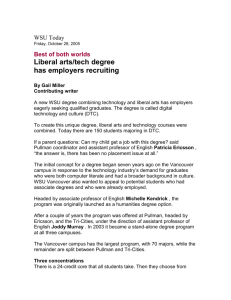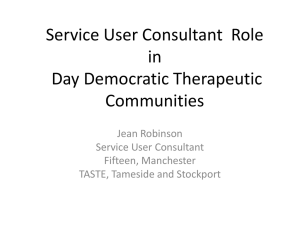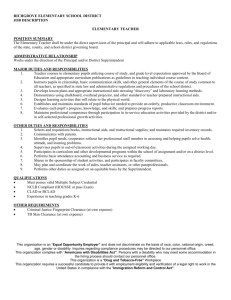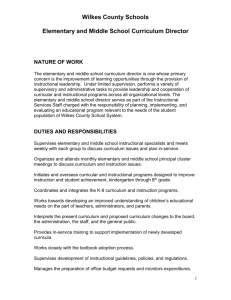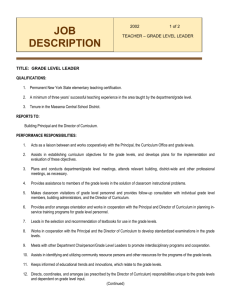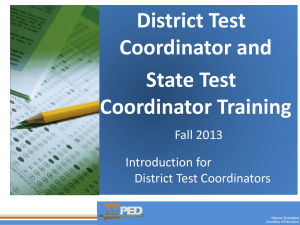Budget Summary – 2014-2015
advertisement
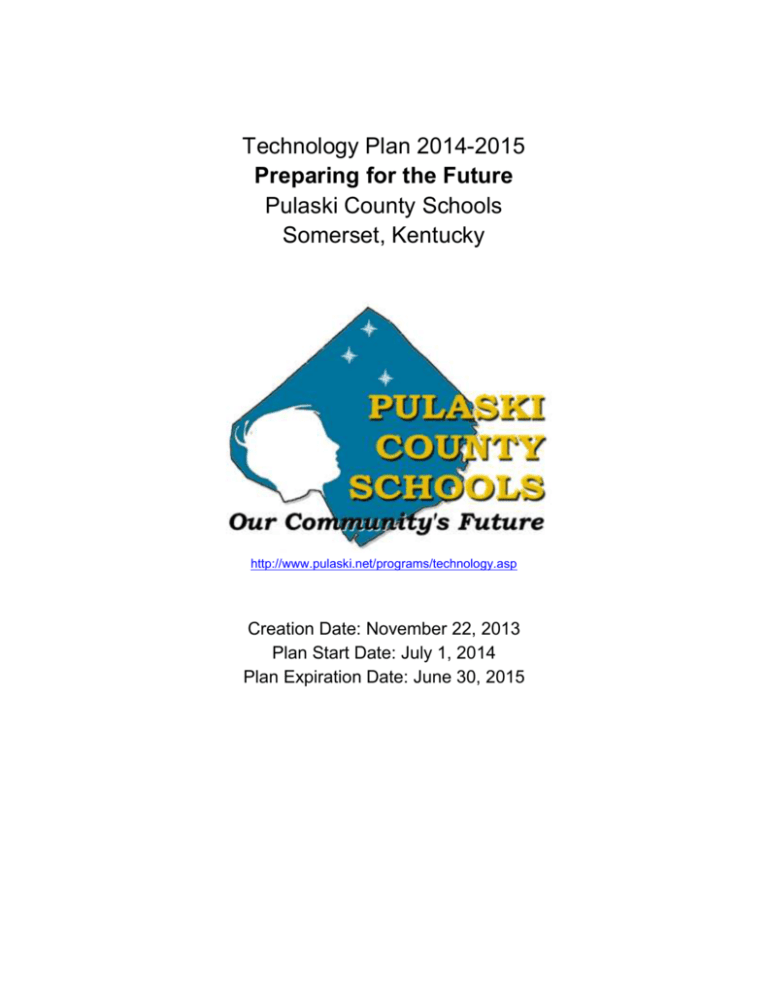
Technology Plan 2014-2015 Preparing for the Future Pulaski County Schools Somerset, Kentucky http://www.pulaski.net/programs/technology.asp Creation Date: November 22, 2013 Plan Start Date: July 1, 2014 Plan Expiration Date: June 30, 2015 Acknowledgments This report results from the concentrated effort by the District Technology Leadership Team whose extraordinary dedication has brought the assigned project to completion. Most importantly, the District Technology Leadership Team extends its heartfelt thanks to the administrators, staff members, students, parents, and community members who assist our district in the integration of technology in instruction. District Technology Staff School Technology Coordinators Teresa Nicholas, District Technology Coordinator Janel Grider, Burnside Elementary Dave Perison, Microcomputer Specialist II Delana Smith, Eubank Elementary Jennifer Stevens, Executive Secretary Bereda Weddle, Nancy Elementary Jennifer Duell & Amy Hammond, Oak Hill Elementary School Library Media Specialists Lori Phelps, Pulaski Elementary Julie Dick, Northern Middle School Ronda Crawford, Shopville, Elementary Janel Grider, Burnside Elementary Susan Hoseclaw, Southern Elementary Annette Lawrence, Eubank Elementary Trena Kerns, Northern Elementary Lori Phelps, Pulaski Elementary Jason Sammons, Southern Middle Trena Kerns, Northern Elementary Lana Mayfield and Chris Hayes, Northern Middle Charity Edwards, Southwestern High James Murray, Pulaski County High Charity Edwards, Southwestern High Additional District Contributors Selena McEnroe, Day Treatment Center Lisa Colyer, (District Writing Consultant/CDIP Coordinator) Donna Bullock, Memorial Education Center Rebecca Wright, Director of Finance Ben Barnett, Sunrise Children’s Home Patrick Richardson, Assistant Superintendent Mardi Montgomery Curriculum Specialists Angela Robinson, Burnside Elementary School Student Advisory Groups Karen Smith, High School Curriculum Specialist Northern Middle School Ryan Montgomery, High School Curriculum Specialist Southern Middle School Sheryl Cooper, Southern Middle School Pulaski County High School Mary Lee Craig, Northern Elementary School Southwestern High School Shannon Dick, Shopville Elementary School Melanie Gover, Oak Hill Elementary School Donna Petrey, Eubank Elementary School Melissa Prichard, Pulaski Elementary School Angela Spears, Nancy Elementary School i Table of Contents EXECUTIVE SUMMARY ................................................................................................ 1 PLANNING PROCESS AND METHODOLOGY ............................................................. 2 CURRENT TECHNOLOGY AND RESOURCES ............................................................ 2 CURRICULUM AND INSTRUCTIONAL INTEGRATION GOALS .................................. 4 CURRICULUM AND INSTRUCTIONAL INTEGRATION GOALS – EVALUATION....... 9 STUDENT TECHNOLOGY LITERACY GOALS .......................................................... 10 STUDENT TECHNOLOGY LITERACY GOALS – EVALUATION ............................... 13 STAFF TRAINING/PROFESSIONAL DEVELOPMENT GOALS ................................. 14 STAFF TRAINING/PROFESSIONAL DEVELOPMENT GOALS – EVALUATION ...... 17 TECHNOLOGY GOALS ............................................................................................... 18 TECHNOLOGY GOALS – EVALUATION .................................................................... 24 BUDGET SUMMARY.................................................................................................... 25 ATTACHMENTS/APPENDICES (OPTIONAL) ............................................................. 28 i Executive Summary Each year the Pulaski County School System updates its Comprehensive District Improvement Plan (CDIP), in which general technology activities are embedded. This Technology Plan is a component of the 2014-2015 CDIP. The purpose of the Technology Plan is to provide detailed information regarding the district’s technology vision and a plan of action to achieve its technology goals and vision. The person responsible for coordinating the technology activities is the District Technology Coordinator in partnership with the Information Systems staff and the District Technology Leadership Team. The Leadership Team is comprised of the School Technology Coordinators, Library Media Specialists, and Curriculum Specialists. These groups as well as other teacher leaders in the schools receive ongoing training to continually develop, implement and refine technology knowledge and skills. The purpose of all training is for participants to model their newly acquired technology skills, via the Professional Development Direct (PD Direct) model, with other teachers and staff with the goal to increase the integration of technology into curriculum, instruction, assessment and administrative processes. Utilizing technology to provide engaging, anytime-anywhere access will result in increased student achievement. Utilizing technology for administrative duties will increase efficiency and access to administrative staff. School and district administrators, along with support personnel, participate in district trainings as well as sessions customized to their needs. The technology groups are advocates for their groups’ technology plans and needs. From their input an effort is made to find common needs issues and solutions that can be addressed at the district level. Each school team provides technology leadership at the school level, but also assists district technology staff in the development of a vision for the entire school system. As part of the team’s efforts, the current status of technology and its role in regard to students, faculty/staff, parents, and the community is communicated during meetings, electronic mail, and technology self-assessment. From a synthesis of the information collected, the vision was updated, and a set of goals and objectives were established to help the district achieve our mission. The mission of The Pulaski County School System is to provide a safe, supportive environment to meet the individual needs of all students and ensure they are college and career ready. In order to support district mission, the technology community within Pulaski County Schools will help build a learning community that promotes lifelong learning and technology literacy. Learners will be able to interact successfully in a technology rich environment with embedded information and communications technologies to achieve their personal, education and workplace goals. They will skillfully use technology to access, retrieve, and use information in a global society. 1 Planning Process and Methodology Formal technology planning began in Pulaski County Schools in February, 1995. At that time members representing staff from central office and each district school met to discuss the district’s needs for a clear technology plan and agreed that the development of a District Technology Plan was a priority. The original committee met regularly for four days and developed a vision statement, survey instrument, goals, and objectives. The first formal technology plan was established to coincide with these results. Since 1995, the Kentucky Department of Education (KDE) has required a comprehensive improvement plan, formerly called a consolidated plan, from each district. The CDIP serves as the tool in which the district communicates its goals, priorities, and strategic activities to KDE, school stakeholders, and the community. As stated previously, the Pulaski County Technology Plan is a component of the 2014-2015 CDIP, and its purpose is to provide a plan of action to achieve the district’s technology vision and goals in addition to supporting other district goals as outlined in the 2014-2015 CDIP. The technology planning committee, consisting of representatives from central office and each district school, meets in person and virtually to review and revise The Pulaski County Technology Plan annually. The plan is evaluated throughout the year to monitor progress via the CDIP progress notes which are submitted quarterly. The committee considers all data available in the review and planning process and plans accordingly in order to ensure that we continue to move forward on our journey toward the vision. Current Technology and Resources The following data was included in the Technology Tools Readiness Survey submitted to KDE in December, 2013. Total Number of Elementary Student Workstations = 1603 Total Number of Secondary Student Workstations = 840 Total Number of Teacher Workstations = 559 Total Number of Administrator and other personnel Workstations = 418 All workstations use Win XP or higher OS and connect using Internet Explorer All schools have an STC who is paid a stipend All schools are connected to WAN via Fiber Projector = 535 ceiling mounted units and 25 mobile units Interactive White Boards = 547 mounted with 2 mobile Student Response systems = 100 Interactive Slates = 150 Document cameras = 320 All schools are connected to WAN via fiber, aggregated 1 gig connection to the data center nearing full utilization. With increased demands, there will be a need for speed upgrades within the next 2 years. Additionally, the old wireless system is reaching end of life and will slowly be replaced. The new system in place at the middle schools and high schools has higher density capacity for more clients at higher speeds. This will allow us to move forward to fully support the integration of personally owned devices. To maintain and support all district technology, the board employs ten technology support personnel including: 1 District Technology Coordinator (DTC), 1 Network Administrator, 1 Systems Analyst, 3 Microcomputer Specialists, 3 Communication Wiring specialists, and 1 Executive assistant. The DTC conducts scheduled and as-needed training on various technology equipment and software to facilitate integration into instruction and learning. Furthermore, training is provided to students in the 2 classroom to promote the knowledge and use of technology appropriate to enhance educational experiences. The technology department coordinates all technology purchases and provides technical support to all sites in the school district. Microcomputer Specialists visit their assigned schools on a weekly basis and communicate with the School Technology Coordinator as needed. A representative of the technology department serves on all construction project committees and is involved in all phases of planning and implementation of those projects. The technology department meets on a biweekly basis to discuss progress and concerns regarding current projects and issues. The District Technology Coordinator attends biweekly curriculum and instruction meetings and also meets with the Superintendent and Central Office staff monthly. 3 Curriculum and Instructional Integration Goals Goal 1 Increase the averaged combined reading and math K-Prep scores for elementary school students from 52.8% to 68.1% and for middle school students from 48.9% to 62.31% in 2015. Increase the percent of Proficient/Distinguished in reading and math combined for high school students from 52.8 to 67.5 in 2015. Action Plan: Provide schools with appropriate technology tools and software to enhance learning for all students Project/Activity Instructional Outcome Provide access to software for learning including diagnostic, remediation and acceleration (NovelStar, Read 180, Read/Write Gold, SuccessMaker Math and Reading, Accelerated Reading and Math, SMART, ActivStudio, Reading Plus, Lexia, WIN). -Students will have access to effective learning tools including those for remediation and acceleration allowing opportunities for increased differentiation to meet individual student needs. Teachers will have access to software in lesson design, teaching and for evaluation of student performance resulting in increased engagement and effective differentiation. Indicator -Increase in Proficiency as measured by KPREP/EOC Timeline 7/2014 – 6/2015 Person(s) Responsible Principals, Curriculum Supervisors Funding Source General funds, Title I, IDEA -Increase % of students meeting benchmark on EPAS system. -Increase % of students identified as career/college ready. 4 Teachers will maintain up-to-date classroom webpages including utilization of web 2.0 tools. Stakeholders (parents and students) will have access to up-todate classroom and school information, events, lessons and learning activities resulting in increased collaboration between the home and school for improved academic achievement for all students and increased participation of parents in the education of their children. -website hit counter Teachers/Schools will utilize software to record and share special student activities/events, newscasts, and instructional videos. - Teachers will have the ability to provide seamless integration of high quality interactive instruction to all students at anytime and anywhere. -Increase in Proficiency as measured by KPREP - Students and parents will be able to access instructional content on demand as a means of review, remediation or acceleration. -Increase % of students identified as career/college ready. Ongoing Principals, curriculum specialists General Funds, Title I, eRate 7/2014 – 6/2015 Principals, curriculum specialists N/A -teacher and parent login reports -lesson plans reflecting use of blogs, wikis, etc -Increase % of students meeting benchmark on EPAS system. 5 - Daily announcements and school news shows can be made available to parents and community members via school web or on-demand access. Teachers will utilize the tools provided through Microsoft Office 365 (Lync & SkyDrive Pro) to effectively communicate with peers to maintain vertical & horizontal alignment. Teachers will be able to participate in small professional learning communities to share ideas and develop common assessments and instructional practices -Attendance rosters All teachers will utilize CIITS for creating and administering common assessments, unit planning, lesson planning, and collecting/analyzing data. Students will receive instruction based on aligned, rigorous standards with the ability to complete common assessments receiving immediate feedback to judge level of mastery of those standards. -Increase in Proficiency as measured by KPREP Ongoing N/A -Conference logs 7/2014 – 6/2015 -Increase % of students meeting benchmark on EPAS system. -Increase % of students identified as career/college ready. 6 Goal 2 Increase the percentage of students who are college and career ready from 69.6% to 80% in 2014. Project/Activity Instructional Outcome Indicator Monitor the enrollment of students in Math and/or Reading intervention classes to improve student mastery of content through utilization of software such as Lexia, Reading Plus, ALECs, WIN, NovelSTAR, etc. Students will have access to effective learning tools for remediation in order to improve skills and master content. Increase in % of students meeting ACT benchmarks by the 11th grade year. Students will continue to utilize the ILP program with specific utilization of the embedded on-line test prep strategies/activities to improve ACT scores. Students will have access to effective test prep/practice software to prepare for the ACT. Increase in % of students meeting ACT benchmarks by the 11th grade year. Progress monitor interventions regularly to ensure progress and retest utilizing Compass Students will improve skills and master content. Increase in the % of students deemed college ready. Timeline 7/2014 – 6/2015 Person(s) Responsible Funding Source Principal, BAC, secondary supervisor SEEK, GEARUP, ESS. 7/2014 – 6/2015 Principal, BAC, ILP coordinator. NA 7/2014 – 6/2015 Principal, BAC, Curriculum specialist NA 7 and/or KyOTE to gage success for 12th grade students. Provide schools with appropriate equipment and technical support to administer Workkeys and/or KOSSA testing online. Students will be able to utilize the current technology to complete assessment and receive timely feedback on success of achieving career ready status. Increase in the % of students deemed career ready. 7/2014 – 6/2015 Principal, STC, DTC General funds, SEEK, KETS Provide students one-on-one guidance in terms of scheduling and long-term planning utilizing tools such as the Pulaski County KOSSA tool. Teachers and students will be able to quickly see what courses have been successfully completed and/or scheduled in order to make informed decisions regarding what courses should be taken to complete career tracks to be career ready. Increase in the percent of students deemed career ready. 7/2014 – 6/2015 Principal, guidance counselors NA Action Plan: Provide schools with assessment support and intervention software to ensure college and career ready. 8 Curriculum and Instructional Integration Goals – Evaluation Pulaski County Schools continually works to integrate technology into curriculum and instruction with the goal of enabling teachers to provide rigorous lessons that will appeal to multiple learning styles ultimately improving student engagement and success. All classrooms are equipped with Intelligent Classroom components including ceiling mounted projectors, interactive white boards, integrated sounds systems and classroom webpages that support the use of Web 2.0 tools. All schools also have access to document cameras and student response systems. All of these efforts are in place in order to provide all students with access to information and support as needed with the ultimate goal of improving performance and ensuring all students are college and/or career ready when exiting the Pulaski County School System. The district employs a district technology coordinator, five district technicians and a school technology coordinator in each school to support the integration of technology in the classroom. Professional development is a key to success therefore training and support is available for all technology components whether by in-district staff or vendors. Data will be gathered from multiple sources including: KPREP reports reflecting increase in the percentage of students scoring Proficient/Distinguished with corresponding decrease in percentages of students scoring Novice. Curriculum, instruction and assessment will be adjusted as necessary to improve student performance. EPAS reports (Explore, Plan and ACT) reflecting an increase in the percentage of students meeting benchmarks. Website analytic tools reflecting student interactivity with classroom webpages including participation in blogs/wikis. District & School Report Cards as produced by KDE regarding overall assessment performance. Observations: District curriculum team will use the eWalk system and customized observation template to monitor classroom instruction including the integration of technology. Reports will be shared on a monthly basis with the curriculum team. Feedback will also be provided to teachers and school administration on an ongoing basis. The information gathered will be shared with all stakeholders via CDIP progress notes as well as presentations at board of education meetings, principal meetings, curriculum team meetings and staff meetings. 9 Student Technology Literacy Goals Link to the Program of Studies and the Kentucky Core Academic Standards: http://www.education.ky.gov/kde/instructional+resources/curriculum+documents+and+resources/program+of+studies/default.htm Goal 1 All students will receive targeted training and experiences in integrating technology effectively and appropriately into everyday learning and life thereby empowering them to compete in a modern, global society Action Plan: Strategies/Activities Strategy/Activity Instructional Outcome Indicator District and school staff will conduct lessons focused on online safety, digital citizenship and digital etiquette throughout the year at all grade levels including review of AUP with all students within week 1 of school. - Students will have an increased awareness of appropriate online behavior and practice digital citizenship in all aspects of their education and online life. - Decrease in disciplinary referrals for inappropriate technology use. Provide access to web 2.0 tools in the classroom. - Instruction will promote the concept of collaboration and the 21st century emphasis that learning is continual and not limited to the school classroom. Learning takes -Lesson plans Timeline Ongoing Person(s) Responsible Funding Source Principals, DTC, SRO N/A Principals, STC, DTC N/A - PACES (Pulaski Assessment of Computer Expertise for Students) reports on selfreported inappropriate behavior online. -Observations using eWalk Ongoing -Website reports 10 place in the global classroom. Purchase equipment, software and other materials for STLP. Students will be able to acquire higher level thinking skills and also compete at technology competitions. -Participation in regional and state STLP showcase. Provide access to educational hardware and/or software to enhance learning and provide diagnostic and assistance or support for those in need of remediation or acceleration. i.e. Aimsweb, Thinklink, Novelstar, Waterford, SuccessMaker, KYVL Read 180, Renaissance Learning products - Students will have the ability to use technology in remediation to develop skills or in acceleration to enhance learning. -Increase in Proficiency as measured by KPREP Students in grades 6 – 12 will continue to utilize the Individual Learning Plan (ILP) program to explore careers and set goals. -Students will have access to up to date information regarding career and college options. Ongoing DTC, STLP sponsors KETS, school activity funds Ongoing Principals, Curriculum Supervisors, DTC Title I, SEEK, General funds Ongoing Principals and district ILP coordinator N/A - Student technology skills assessment -Increase % of students meeting benchmark on EPAS system. -Increase % of students identified as career/college ready. -ILP completion reports. 11 Goal 2 All 8th grade and 12th grade students will be proficient in technology as evidenced by district assessment/observations. Action Plan: Strategies/Activities Strategy/Activity Instructional Outcome Indicator Timeline Person(s) Responsible Funding Source Schools will have student technology leadership programs that work collaboratively to solve school based problems. -Students will learn advanced technology and leadership skills -Participation rates at regional and state STLP showcases Ongoing STC, STLP sponsor, DTC KETS, School activity funds Schools will administer the PCS technology proficiency assessment and provide students with multiple classroom activities to demonstrate technology skills. -Data will be available to determine proficiency levels for students in grades 8 and 12. -Proficiency levels of 8th and 12th grade students Ongoing Principals, STC/computer teachers, DTC General funds, KETS PCS curriculum guides will include activities to meet the Program of Studies guidelines and incorporate the 9 components of digital citizenship. -Students, teachers and parents will be knowledgeable of the technology skills expected at each grade level. -Curriculum guides. Ongoing Principal, Curriculum supervisors, and Curriculum specialists N/A -Lesson plans -Students will receive instruction and develop an understanding of digital citizenship 12 Student Technology Literacy Goals – Evaluation Pulaski County Schools continually works to improve student technology literacy through a variety of activities including participation in computer lab classes, STLP programs, guest speaker presentations as well as through integration of technology in daily instruction. Students are expected to interact with technology tools daily through the 21st Century classrooms (interactive white boards, student response systems, and document cameras), educational software (SuccessMaker, Read 180, NovelStar, Study Island, ThinkLink, ILP) and project assignments requiring the use of productivity software (MS Office) and participation in classroom blogs. Through Advanced KY training and with access to the many tools, teachers are collaborating across disciplines and grade levels to create engaging lessons. These lessons require student collaboration and critical thinking for success. Students are formally and informally evaluated in regards to technology literacy. Students must demonstrate technology proficiency in a variety of ways including through regular classroom assessments and projects, observations, and district assessments. Students are formally assessed on technology literacy at grades 8 and 12. Data will be gathered from multiple sources including: Observations; a district developed observation tool will be utilized by school and district personnel to gather data about teaching and learning in the classroom including the incorporation of technology use by students. The results will be available to each school through reports generated within the eWalk system and also at the district level by school, grade, or content area. PCS Technology Literacy Exam: an assessment tool to evaluate student mastery of technology skills. School results are shared with respective principals to guide discussions on technology curriculum and school improvement. The results are also reported as part of the Technology Tools Readiness Survey as a measure of proficiency for 8 th and 12th grade students. Disciplinary reports: A survey of discipline reports district wide and by school will be used to monitor numbers of referrals because of inappropriate technology use. Discipline data will be shared with principals and district administration. Results will be used to identify areas of need for presentations and classroom instruction. The information gathered will be shared with all stakeholders via CDIP progress notes as well as presentations at board of education meetings, principal meetings, curriculum team meetings and staff meetings. 13 Staff Training/Professional Development Goals Goal 1 Empower teachers to integrate technology in instruction and learning activities on a regular basis. Action Plan: Strategies/Activities Strategy/Activity Instructional Outcome Indicator District DTC will work with individual teachers and small learning communities to embed use of technology skills in lesson designs and student learning activities. - Students will apply technology skills in the successful completion of learning projects in all content areas. Provide for technology professional development activities including attendance at local, state and national tech conferences. - Increase and improve teacher ability to integrate technology seamlessly into instruction and learning to improve student achievement. -Formal and informal observations Provide information, training, and support to all teachers and administrators on new hardware and software for -Teachers will have the ability to increase their skills to stay current with purchased technologies. - Increase and improve teacher ability and -PD evaluation forms -Formal and informal observations. Timeline Person(s) Responsible Funding Source Ongoing DTC & principal General Funds, IDEA Ongoing DTC, principals District and school PD funds Ongoing DTC, STC, curriculum specialist District and School PD funds -eWalk data -Lesson plans - Build school level technology leadership capacity. -District eWalk data -PACE -Lesson plans -Models of student work 14 instructional integration according to need via PD direct, small group, district web pages, and VTC. leadership capacity to integrate technology seamlessly into instruction and learning to improve student achievement. -Formal and informal classroom observations Collaborate with schools to provide CIITS training to enable teachers to develop and refine curriculum maps, lesson plans, assessments, and instructional units that are aligned and rigorous. Teachers will have the ability to effectively utilize resources within the CIITS system to enhance instruction and learning within the classroom. -Lesson plans with utilization of CIITS resources. -- PACE Ongoing Curriculum Supervisors RTTT -administration of assessment within CIITS Goal 2 Teachers and administrators will meet National Technology Standards for Teachers and the National Technology Standards for Administrators. Action Plan: Strategies/Activities Strategy/Activity Teachers and administrators will utilize tools (website, email, OneCall, web 2.0 tools) to create and Instructional Outcome -Students and parents will be informed about school related activities in a timely manner. Indicator -Parent advisory committee feedback Timeline Ongoing Person(s) Responsible Principals Funding Source N/A -Call logs -Parent surveys 15 share information and collaborate with stakeholders to improve educational experiences. - Evaluate teachers’ technology skills using selfassessment tool (PACE) and formal/informal classroom observations. Teachers will receive technology professional development based on individual and small group needs thereby increasing ability to integrate technology effectively in teaching and learning. -PACE results Provide information, training, and support to all staff on technology standards for students, staff and administrators as defined by state standards and EPSB (ISTE standards) - Staff will understand 21st Century skills and expectations allowing for more effective integration into lessons and learning activities increasing positive student engagement and instructional differentiation for all students. -PACE results Ongoing DTC, Curriculum team, principals General funds Ongoing DTC, principals, superintendents N/A -Teacher evaluations. -eWalk observations -Teacher evaluations. -Administrator evaluations -eWalk observations 16 Staff Training/Professional Development Goals – Evaluation The technology department for Pulaski County Schools endeavors to enable students and staff to become proficient in the use of technology and believes that technology integration should be a seamless part of everyday life. To accomplish this, the PCS technology department will continue to provide ongoing professional development to teachers, administrators and support staff to increase the effective use of educational technology in instruction and for administrative duties. Attendance records and evaluation forms will be used to record teacher participation and to obtain valuable feedback about sessions. All technology professional development opportunities will be advertised district wide via email communication and through the use of a registration program in CIITS. Ongoing training opportunities offered by the technology department may include sessions such as: Application-based training for classroom use and administrative uses (MS Office, Discovery Ed including assessment and streaming videos, Read-Write Gold, etc.). Classroom webpage design and content including the use of blogs and online homework. Effective technology integration strategies. Intelligent Classroom components (Interactive white boards/software, Document cameras, student response systems, etc.) PD Direct to meet individual needs Use of KDE provided resources (CIITS, Student data tool, etc.) A full listing of in-house training opportunities may be found on the Pulaski County Schools website. Technology department members will continue to attend monthly regional technology meetings, state meetings (KySTE) and national technology meetings (ISTE) as available. Evaluation of staff training and professional development activities will consist of: Annual Pulaski Assessment of Computer Expertise (PACE), a technology self-assessment for teachers. Individual school results are shared with respective principals and district results are shared with district administrators and local school board members by June. Results of the survey are used by district technology staff to plan professional development activities to address areas of need. KPREP/EPAS reports reflecting increase in the percentage of students scoring Proficient/Distinguished and/or meeting benchmarks. Curriculum, instruction and assessment will be adjusted as necessary to improve student performance. Observations: District curriculum team will use the eWalk system and customized observation template to monitor classroom instruction including the integration of technology. Reports will be shared on a monthly basis with the curriculum team. Feedback will also be provided to teachers and school administration on an ongoing basis. Professional Development Attendance – A record of PD attendance will be maintained via staff sign in sheets and evaluation forms. 17 Technology Goals Goal 1 Provide local, long distance and cellular service to district sites for communication among students, parents, and staff. Action Plan: Strategies/Activities Strategy/Activity Instructional Outcome Telephone service for local and long distance calling will be purchased (VOIP) and maintained in every district site to support instruction and communication between schools and all stakeholders. - Teachers will be able to maintain contact with parents in support of student success. Cellular services will be provided to district personnel/administration to enhance communication allowing for timely sharing of information or needs throughout the district. -District staff will be available to teachers/schools throughout the day. - All will have access in a timely manner allowing high quality communications with parents, community and professional peers. -Immediate access to critical support services (maintenance, tech, student services, admin.) will be available to all PCS personnel. Indicator -PCS work order system will document and measure the number of work orders and/or downtime of systems at every site. -Critical work requests documented through the PCS work order system. Timeline Ongoing Ongoing Person(s) Responsible Funding Source DTC General funds, USF/e-Rate DTC General funds, USF/e-Rate -Call logs 18 Goal 2 Upgrade and maintain a data network capable of providing high speed access to all stakeholders to access resources as needed at the local, state and national levels. Action Plan: Strategies/Activities Strategy/Activity Instructional Outcome Indicator Purchase and maintain Wide Area Network services. -All will have the ability to access electronic information in a timely manner allowing high quality communications with parents, community and professional peers. -District Tech Readiness Survey Provide schools with equitable access to computers and related equipment including Intelligent Classroom Components, streaming media, Wireless Access, application software, electronic mail, and antivirus - All will have the ability to select tools to help them obtain electronic information, analyze and synthesize it, and present it professionally in a manner that actively and effectively engages students. -Computer count by school Provide schools with technical and - Staff and students will receive efficient -Technician rotation schedule Timeline Ongoing Person(s) Responsible Funding Source DTC, System admin. General funds, USF/e-Rate Ongoing DTC General Funds, KETS, Buildings and Grounds Ongoing DTC, System Admin General funds -Real time network monitoring - Projector count by school - Interactive devices (white board, SRS, etc) by school -Software licenses by school -Tech Readiness Survey, TAR Report and School report card 19 administrative support to ensure that all have equitable access to integrated technology. and timely assistance from district support staff resulting in a continual and efficient flow of curriculum and instruction. - Work order system Installation and/or maintenance and repair of district and building level data infrastructure including high speed switches and WAPs that will support an increase in instructional devices as well as personally owned devices. -Students will have increased access to instructional technology. -Improved performance on KPREP. -Network will experience increase in reliability. -Higher speed access to network resources. Ongoing DTC, System Admin. -Improved proficiency ratings on technology literacy assessments. General funds, Buildings and Grounds, USF/eRate.KETS Goal 3 Obtain and maintain equipment and software to support instructional and administrative needs district-wide. Action Plan: Strategies/Activities Strategy/Activity Provide district with software for administrative duties including but not limited to: staff absence Instructional Outcome Administrative duties will be streamlined allowing for cost savings and Indicator - AESOP reports - payroll reports Timeline Ongoing Person(s) Responsible DTC, CFO, System Admin Funding Source General funds, KETS -Employee application reports 20 reporting/substitute notification (AESOP), employment application software (School Recruiter), payroll software (eStub), and absence/substitute interface with MUNIS (AESOP Interface). improved efficiency. Promote the use of VBrick content server for school and district productions - All will have the ability to access educational resources and/or news on demand as provided by cable services. -Access logs Communicate with parents via AUP in the Code of Conduct, email and school and Teacher websites how technology is being applied in their child’s education. Provide additional communication via Infinite Campus Parent Portal, IC portal iphone app, and One-Call Now. - The collaborative partnership between school and home will be advanced by providing pertinent school information including school technology based opportunities and the ability to monitor respective personal information. -Surveys of teachers, parents and students. Ongoing DTC, System Analyst NA Ongoing DTC General funds, Title I, eRate, KETS -Video logs - Website hit counter - Teacher and parent login reports 21 Goal 4 Provide information and training to all students, staff and parents on CIPA and district CIPA compliance. Action Plan: Strategies/Activities Strategy/Activity Instructional Outcome Indicator Communicate with parents and students via AUP and Code of Conduct outlining technology access rights and responsibilities. -Students and parents are aware of behavior expectations. -AUP All schools will view PCS Safe Schools videos annually. Students are educated about online issues including cyberbullying, and Internet safety. -View logs from Vbrick Maintain safe Internet services via use of Proxy server, filtering software and classroom monitoring software. -Students and staff will be protected from inappropriate content access. Maintain/update technology department web site providing information and resources on -Stakeholders will have access to information and resources related to appropriate online behavior resulting Timeline Person(s) Responsible Funding Source Ongoing DTC N/A Ongoing DTC, Principals, DPP N/A -Proxy logs Ongoing DTC, System admin. General funds, KETS - Decrease the number of students receiving disciplinary referrals for Ongoing DTC N/A -IC reports -Students and parents are knowledgeable about CIPA. -Lesson plans 22 Technology and technology literacy – safety, cyber bullying, digital citizenship in a decrease of inappropriate behavior by students. inappropriate technology use. - Decrease the number of students self-reporting inappropriate behavior online as measured by the PACES - -Website hit count 23 Technology Goals – Evaluation Comprehensive District Improvement Plan is approved by the local board and submitted to KDE every other year with updates at the end of the first year. The district completes progress notes quarterly to reflect completion of activities and make mid-course corrections. Amendments are made as needed. Technology activities are embedded in this plan at the district and school levels. Annual Technology Activity Report is approved by the local board and submitted to KDE in the fall. This report lists all technology purchases regardless of funding source. Annual Technology Tools Readiness Survey is submitted to KDE in December. This report provides information on the status of the current technology inventory. Schoolfusion (web services) analytics. These reports indicate number of visitors to websites, number of staff member, parent and student logins for a given time period. Reports will be shared with district and school administration as well as teachers on an ongoing basis to monitor and encourage use of resources for communication. Machines Database is used to track technology work orders as well as technology inventory. The DTC and System Admin will share reports with the district technology department on an ongoing basis and address any areas of need as they arise. KPREP and EPAS reports reflecting increase in the percentage of students rated proficient or meeting benchmarks. Curriculum, instruction and assessment will be adjusted as necessary to improve student performance. Observations: District technology staff will conduct walkthroughs at all locations to conduct inventory audits as well as ensure functionality of equipment. Information and reports will be shared as part of regular department meetings until all issues are resolved. District curriculum team will use the eWalk system and customized observation template to monitor classroom instruction including the integration of technology. Reports will be shared on a monthly basis with the curriculum team. Feedback will also be provided to teachers and school administration on an ongoing basis. Network monitoring software is used to ensure that all network resources are available at designated times with automatic notification to appropriate personnel if communication of devices/equipment is lost. 24 Budget Summary – 2014-2015 Acquired Technologies and Professional Development Ed Tech Competitive Title IID Ed Tech Formula Title IID E-Rate Telecommunication services including local and long-distance telephone service, WAN services and internal connections, and cell phone services. Technical and administrative support to all schools. (district tech dept. salaries, STC stipends, and district tech maintenance fund). $89,551.44 $97,500.00 $26,764.80 Webhosting services to provide district, school and teacher web pages Educational software to enhance learning (NovelStar, Accelerated Reader, SuccessMaker, Waterford, KYVL) Administrative software: Infinite Campus and One Call Now for communication, AESOP, SchoolRecruiter, E-Stub, MUNIS, Destiny for LMS, eWalk, ValEd Purchase equipment, software and other materials for STLP $20,066.76 Computers and related equipment/software NCLB/other than Title IID KETS Other (Specify) $12,691.80 – General Fund $499,248.86 + $5,000 + $14,500 General fund $224,103.00 – Title I, General Funds, SEEK $77,349.18 $82,702.18 – General funds, SEEK $5000.00 $160,000 (MS Office and RWG) $20,000 – General Construction 25 $2,500 – district PD, RTT Attendance at local, state and national technology conferences Assessment software TOTAL $210.00 SEEK $0 $0 $233,883.00 $242,349.18 $860,955.84 *This is a cost estimate and could change slightly with new bid with the eRate process incomplete at this time. Bids are currently being evaluated 26 Budget Summary – Narrative As stated previously, all technology purchases are coordinated by the district technology department. This allows us to ensure that district/KETS standards are maintained and that integration of acquired services is seamless in the existing infrastructure. The technology department is represented on planning committees at the district level including construction committees, PD committees and curriculum committees, Various members of the department participate as members of the committees with the DTC filling an integral role as a bridge between curriculum and technology with cross responsibilities as DTC, assessment coordinator, PD coordinator, SBDM coordinator, and director of curriculum and instruction. Additionally, the district finance officer and assistant superintendent for facilities and personnel serve on the technology planning committee and work closely with the DTC throughout the year to ensure that the technology needs for the district are met. Curriculum and Instruction Integration Goals: Goal 1: $244,169.76 General Funds/KETS/Title I/ SEEK/IDEA: o Software maintenance or purchase to enhance learning by providing students with remediation or acceleration based on individual needs. Software includes but is not limited to NovelStar annual subscription, ALEKS, Read 180, Reading Plus, Lexia and KYVL. o Maintain subscription for webhosting services to provide additional communication tools between the school and home. Provide anywhere, anytime learning through utilization of teacher webpages to share assignments, instructions, and streaming media. (*webhosting is partially eRate eligible at 82% pending approval with discounted billing) Goal 2: $210.00 SEEK: o Cost to administer KOSSA tests and/or WorkKeys assessments online for College/Career Readiness. Student Technology Literacy Skills: Goal 1: $5,000.00 KETS ($5,000.00): o Purchase equipment, software and supplies for STLP activities and competitions. Goal 2: No additional funds required Staff Training and Professional Development: Goal 1: $2,500 PD Funds/KETS ($2,500) o Travel and registration expenses for attendance to local, state and national conferences Goal 2: No additional funds required 27 Technology Vision and Goals: Goal 1: $129,008.04 E-Rate discount (82%) + general funds: Purchase E-rate eligible services pending approval, discounted billing, or reimbursement. o Telecommunications Services: Windstream $89,551.44 Verizon Cellular $39,456.60 ($26,764.80 eRate eligible at discount rate and $12,691.80 not eRate eligible). Goal 2: $796,248.86 General Funds/KETS o Salaries and hardware/software/maintenance repair ($499,248.86 salaries + $5,000 for district tech needs) for District Technology / Information Systems plus Stipends for STCs ($14,500). o Microsoft Select Agreement to include Microsoft Office 2010 (Word, Excel, Access, PowerPoint, Outlook) for all machines, antivirus, Read and Write Gold by TextHelp. o Infrastructure upgrades to Eubank Elementary school to include intelligent classroom components ($20,000 – construction funds) o Maintenance of wide area network services to all locations – eRate eligible service at 82% discount pending approval (TimeWarner service provider - $97,500.00) o Computer purchases spent in accordance to our computer replacement cycle 1:1 Teacher to Computer Ratio 6:1 Student to Computer Ratio 5 Administrative Computers per School 1 Computer per FRYSC Goal 3: $160,051.36 General Funds/KETS/SEEK: Purchase administrative software. o AESOP - staff absence reporting system/substitute notification ($14,973.60) o E-Stub- Payroll software ($11,865.00) o School Recruiter - employee application software ($5,145.00) o Infinite Campus ($49,621.84) o One Call Now Alert System ($12,643.92) o MUNIS ($23,232.00) o Veritime ($9,000.00) o SDP ($9,950.00) o Destiny ($13,200) o eWalk ($6,100) o ValEd ($4,320) Goal 4: No additional funds required 28
